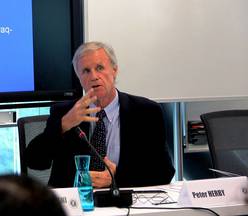30.09.2014

Download the press release | PDF 150KB
Geneva - The European Union welcomed the engagement of thirteen States that have not yet joined the Anti-Personnel Mine Ban Convention at a one-day seminar in Geneva meant to broaden the debate on the perceived utility of anti-personnel mines.
At the seminar organized by the Convention’s Implementation Support Unit, representatives of the following States took part in in-depth discussions on the humanitarian problems caused by anti-personnel mines: Armenia, Azerbaijan, India, the Lao People’s Democratic Republic, Lebanon, Morocco, Nepal, Pakistan, Palestine, Singapore, Sri Lanka, the United Arab Emirates and the United States of America.
 “Enhancing international dialogue on the Convention’s humanitarian aims is an important part of the European Union’s Council Decision in support of the Convention,” said Vasiliki Gounari, disarmament, non-proliferation and human security expert with the European Union’s delegation to the United Nations (Geneva).
“Enhancing international dialogue on the Convention’s humanitarian aims is an important part of the European Union’s Council Decision in support of the Convention,” said Vasiliki Gounari, disarmament, non-proliferation and human security expert with the European Union’s delegation to the United Nations (Geneva).
“The EU has over the years demonstrated its clear commitment to the universalization of the Convention. This reinforces the EU's determination to achieve a zero-victim target and ultimately, a world free of anti-personnel mines,” added Vasiliki Gounari.
“All 28 European Union member states are united in pursuing the objectives of the Convention, this shows the EU is unwavering in its commitment to promote the universal adherence to this landmark Convention and to eliminate anti-personnel mines all over the world,” added Ms. Gounari.
A key topic discussed at the seminar was effective border security without anti-personnel mines.
In a keynote address to the seminar, His Royal Highness Prince Mired Raad Al Hussein of Jordan stated that, “while it is obvious that Jordan exists in a part of the world where national security concerns are profound, when it came to anti-personnel mines, it was clear that the devastating humanitarian, social and economic impacts of these weapons along our borders greatly outweighed any utility that we perceived that we obtained from them.”

“There is no evidence that removing anti-personnel mines has caused any new challenges or increased the illegal activities in border areas,” added Prince Mired.
“On the contrary, illegal activities have dropped and alternative systems have been more effective in providing an early warning.”
In addition to supporting the seminar, the European Union has sponsored high level visits by Prince Mired and Her Royal Highness Princess Astrid of Belgium to the capitals of States not party to the Convention.
In 2013, Prince Mired traveled to Beijing and earlier this year he headlined an anti-landmines symposium in Washington, D.C. Last week, the US announced that it is aligning its landmine policy, outside the Korean Peninsula, with the key provisions of the Convention.
In March 2014, Princess Astrid of Belgium traveled to Oman, a State which then proceeded to accede to the Convention in August of this year.
In addition the participation in the one-day seminar in Geneva by Prince Mired of Jordan, the following other experts took part:
Firoz Ali Alizada of the International Campaign to Ban Landmines;


Penny Satches-Brohs, former border issues advisor with the Organization for Security and Cooperation in Europe (OSCE);


Retired Lieutenant Colonel John MacBride, who for several years served as Coordinator of the Convention’s Universalization Contact Group; and, Peter Herby, former Head of the Arms Unit of the International Committee of the Red Cross and current Director of the consultancy, Petersburg Partnerships.
About the Convention
The Convention was adopted in Oslo in 1997, opened for signature in Ottawa the same year and entered into force on 1 March 1999.
There are now 162 States that have joined the Convention including most of the States that at one time produced anti-personnel mines, every state in the Americas except Cuba and the United States, and every state in Sub-Saharan Africa.
Since entering into force, millions of square metres of once dangerous lands have been released for normal human activity and more than 47.5 million stockpiled mines have been destroyed.
The Convention was the first disarmament instrument to take into consideration the rights of the survivors of a particular weapon.
The Convention’s Implementation Support Unit (ISU) is the secretariat to the Convention.
It is mandated to support the Convention’s implementation machinery and office holders, provide advice and technical support to individual States Parties and communicate and provide information about the Convention.